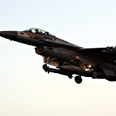
Syria says defenses opened fire on Israeli aircraft overnight
Syria claims IAF aircraft 'broke sound barrier and dropped ammunition' over open areas, Syrian military says its air defense units 'confronted' aircraft. IDF declines comment; Syrian minister: Incident proves Israel not interested in peace
Syrian air defenses opened fire on Israeli aircraft that violated Syrian airspace overnight Thursday, a Syrian military spokesman said.
The Israelis broke the sound barrier and ''dropped ammunition'' over deserted areas of northern Syria overnight, the spokesman was quoted as saying by the official Syrian Arab News Agency.
The Syrians did not say the aircraft struck targets, and it was not clear what the spokesman meant by dropping ammunition. Warplanes sometimes drop extra fuel tanks to make the aircraft lighter and easier to maneuver.
''We warn the Israeli enemy government against this flagrant aggressive act, and retain the right to respond in an appropriate way,'' the Syrian spokesman said, speaking on customary condition of anonymity.
It was not clear if Syria was accusing the Israelis of using warplanes or some type of other aircraft like drones.
"The Israeli enemy aircraft infiltrated into the Arab Syrian territory through the northern border, coming from the Mediterranean heading toward the eastern region, breaking the sound barrier," the spokesman said. "Air defense units confronted them and forced them to leave after they dropped some ammunition in deserted areas without causing any human or material damage."
Military sources declined comment on the report, saying "the IDF does not comment on reports of this nature." Prime Minister Ehud Olmert's office said it was looking into the report.
Syria: Israel only interested in aggression
"Syria has no trust in Israel, which proved that it is only interested in aggression and not in peace," Syrian Information Minister Muhsin Bilal said in an interview with al-Jazeera in response to the report.
"President Bashar Assad has said that this year would be crucial for the region and the entire world. He said more than once that he does not trust the Israeli government, and this act proves that he was right," Bilal said.
"Only yesterday Israeli President Shimon Peres said in Rome that they want peace, while the Syrians don’t, but Israel has proved that it is only interested in aggression and not in peace."
Addressing the fact that the IDF Spokesperson's Office changed its response three times, the Syrian minister said that "the confusion Israel is being hit by now testifies to the fact that it is frustrated. Syria, on the other hand, was clear and stressed that Israel always takes the road of war and does not want peace."
Asked about Damascus' intentions following the incident, the minister remained vague, saying that "Syria maintained the right and the way to respond to Israel's aggression. The Syrian leadership is seriously studying a response in order to make it clear that Israel is continuing its aggressiveness and occupation."
According to the minister, the financial aid of $30 billion transferred to Israel from the United States for 10 years only encourage its aggressive actions.
Another Syrian minister said in an interview with al-Jazeera that he could not confirm any attack by Israel, but that the Israeli army had crossed his country's airspace. "We are a sovereign state and they must not do that," he said.
Months of tension on border
Israel acknowledges flying over Lebanon routinely, but it is unclear how often its aircraft fly over Syria.
Israeli aircraft are believed to fly routine reconnaissance flights over the Golan Heights, in the south of the country, apparently to monitor Syrian army moves. But the incident Thursday was reported over the other side of Syria, in the north near the Mediterranean.
Syrian officials, including President Bashar Assad, have repeatedly warned Israel in recent weeks that the occupation of the Golan Heights ''cannot last forever.''
Concerns grew over the summer that tensions along the frontier could escalate into conflict, but both Syrian and Israeli officials publicly and repeatedly said they had no interest in war. Late last month, Israeli security officials said the army had determined that war with Syria, whose military had reduced its war readiness, was unlikely and Israel began rotating forces out of the Israeli-held Golan Heights.
Syria also is believed unhappy that other Arab countries are headed to a peace meeting in November at which the United States hopes for a high-profile meeting between the Palestinians and Israelis, and perhaps also with Saudi officials.
Syria has long disputed any notion that a comprehensive Arab peace deal can be reached unless it also involves some resolution of the Golan Heights, which it wants back in full.
At the beginning of last summer's war against Lebanon, Israeli warplanes buzzed the palace of Syrian
President Bashar Assad in what analysts called a warning to Damascus.
In June of the same year, they also flew over Assad's summer home in the coastal city of Latakia, after
Syrian-backed Palestinian militants in Gaza captured a young Israeli soldier.










